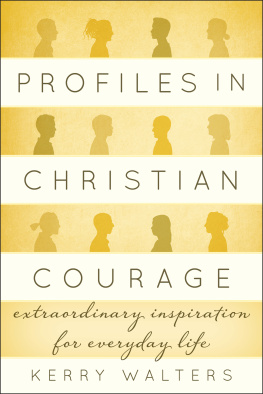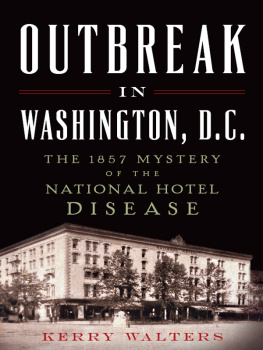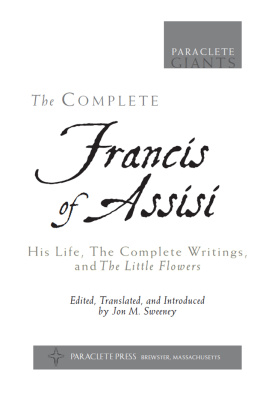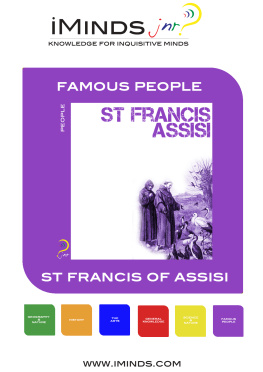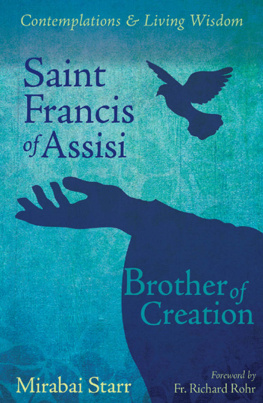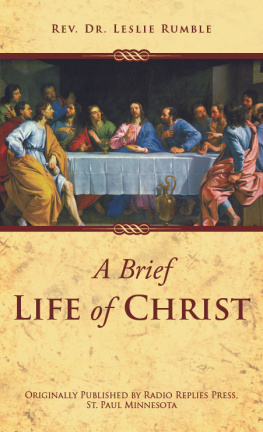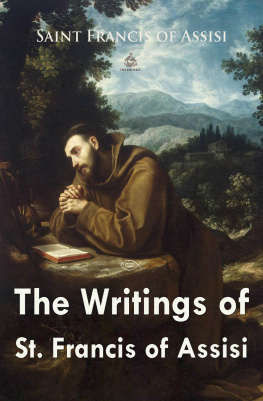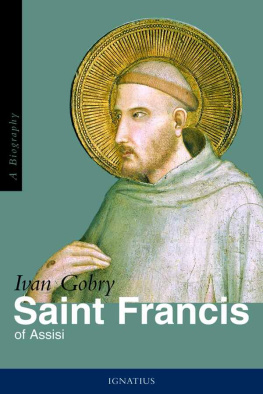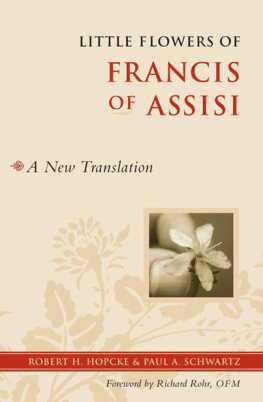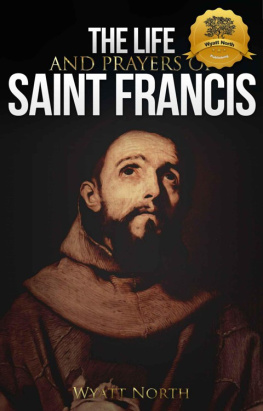Scripture passages have been taken from New Revised Standard Version Bible , copyright 1989 by the Division of Christian Education of the National Council of the Churches of Christ in the U.S.A., and used by permission. All rights reserved.
Cover and book design by Mark Sullivan.
Names: Walters, Kerry S., author.Title: Perfect joy : 30 days with Francis of Assisi / Kerry Walters.Other titles: Finding perfect joy with St. Francis of AssisiDescription: Cincinnati, Ohio : Franciscan Media, 2016. | Originally published under title: Finding perfect joy with St. Francis of Assisi : 30 reflections : Ann Arbor, Mich. : Charis Books, c2002.Identifiers: LCCN 2015049802 | ISBN 9781616369217 (alk. paper)Subjects: LCSH: Francis, of Assisi, Saint, 1182-1226Meditations. | Spiritual lifeCatholic Church. | JoyReligious aspectsChristianity.Classification: LCC BX4700.F6 W25 2016 | DDC 248.4/82dc23LC record available at http://lccn.loc.gov/2015049802
Copyright 2016, Kerry Walters. All rights reserved.
28 W. Liberty St.
who bring me great joy.
Contents
introduction: Looking for Happiness : ix
a brief chronology of st. franciss life : xix
chapter one: Betwixt and Between :
chapter two: Desperate Revelry :
chapter three: A False Start :
chapter four: Whom Do You Serve? :
chapter five: Lord as Leper :
chapter six: What the Crucifix Said :
chapter seven: Going Under :
chapter eight: Naked :
chapter nine: Vocation :
chapter ten: Theia Mania :
chapter eleven: Lady Poverty :
chapter twelve: Holy Simplicity :
chapter thirteen: Gracious Humility :
chapter fourteen: Be Not Afraid! :
chapter fifteen: Burning Love :
chapter sixteen: The Joy Test :
chapter seventeen: Icy Embraces :
chapter eighteen: Singing in French :
chapter nineteen: Celebrating Others :
chapter twenty: Celebrating Sister Mother Earth :
chapter twenty-one: Celebrating God :
chapter twenty-two: What to Do with Brother Body? :
chapter twenty-three: Becoming Prayer :
chapter twenty-four: Wisdom :
chapter twenty-five: Trials :
chapter twenty-six: Little by Little :
chapter twenty-seven: God-Pierced :
chapter twenty-eight: Everyone Has a LaVerna :
chapter twenty-nine: Becoming Who You Are :
chapter thirty: Restoration :
sources :
acknowledgments :
Introduction
~ Looking for Happiness ~
Twenty-five centuries ago, Aristotle wrote a book called Nicomachean Ethics , in which he concluded that the ultimate goal of human beings is and ought to be happiness. Aristotles book became a classic long ago. But when you think about it, its thesis is rather commonplace. When we honestly examine our lives, we quickly realize that what we want is to be happy. What sane person wouldnt? So we scarcely need an ancient Greek philosopher to tell us what we already know.
What isnt so obvious is how to be happy. There are any number of answers out there competing for our attention. The advertising industry, for example, spends billions of dollars annually to tell us that true happiness lies in buying this or that product. Pop psychologists assure us that happiness consists in getting in touch with our primordial self, looking out for number one, or learning how to be intimate. (It all depends on which psychologist you read.)
Speaking of intimacy, popular films and novels imply that we need lots of sex to be happy. And lets not forget money, power, fame, and social influence: These are all touted by various prophets as surefire keys to the kingdom of happiness.
We all want to be happy, but we dont quite know how to go about it. And therein lies the problem, as old Aristotle recognized full well. His diagnosis was that our confusion arises because we too frequently confuse happiness with pleasure. Theres obviously a connection between the two, but theyre not identical.
Pleasures, which are typically responses to external stimuli, tend to be short-lived and sporadic. Moreover, even though immediate pleasurable sensations feel good, they may, in fact, be harmful to our well-being. The pleasurable rush of a cigarette is an obvious example of a harmful pleasure.
Happiness, on the other hand, is more of an abiding inner state than a transient response to an external stimulus. It can feel good at times, but because happiness isnt identical to pleasure, its perfectly possible to be happy even while enduring pain. Additionally, genuine happiness isnt deceptive in the way pleasure can be. Happiness is never harmful, precisely because its the consequence of living a fulfilled, enriched life. When a person achieves the possibilities essential to his or her naturewhen a person becomes a human in the fullest sense of the wordthen happiness is attained.
If Aristotle is right about this distinction between pleasure and happinessand I think he isit follows that many of us may be selling our chance for happiness short by settling for mere pleasure. Lots of pleasuresperhaps most pleasuresare innocent enough. But they cant give us the happiness we crave, even if we add thousands and thousands of them together. If were unhappy, then, its not because happiness is out of our reach; its because we simply havent stretched as high as we could and should.
Happiness as Perfect Joy
Francis of Assisi was someone who stretched as high as he could, and in doing so he found genuine happiness, or what he liked to call perfect joy. Like so many of us, Francis began his search in some confusion, mistaking transient pleasures for the joy he desired. It took him a few years of steadily growing dissatisfaction to figure out where hed gone wrong. Then, with Gods help, he discovered what Aristotle already knew centuries earlier: that true happiness, perfect joy, is possible only when we live up to our innate potentiality and become fully human.
Aristotle, philosopher that he was, thought what made us fully human was our use of reason. But Francis dug deeper, arriving at the far richer conclusion that fulfillment lay in the heartfelt recognition that were made in the image of the living God and that our final purpose in life is to conform reason and will, body and soul, to that image. Perfect joy, in other words, comes when we model ourselves after Christ, the new human, the second Adam, the perfect example of what we can and should be. This is our destiny. This is what we were made for.
Francis spent his entire adult life striving for this conformity to Christ. Fortunately for us, each stage along his way was chronicled in great detail by his contemporaries. Taken together, these accounts give us a marvelously insightful record of what it means to travel the path to God, human fulfillment, and perfect joy. They allow us to embrace Francis as our spiritual director and follow in his footsteps as best we can so that we might find for ourselves what he found.
Even so, we need to begin our journey with eyes wide open, because the path Francis trod isnt always a pleasant one. Remember: True happiness, perfect joy, isnt identical with pleasure. If we choose Francis as a spiritual director, we must make an effort to take what he says seriously, even when it goes against the grain.
G.K. Chesterton once wisely wrote that people who admire Francis often do so because they fixate on those aspects of his life that please them while ignoring the ones they find unsettling or even repugnant. This obviously wont do. Francis must be taken as he is. Scrubbing away anything about him that we find distasteful might leave us with a charming (and unthreatening) garden statue. But garden statues make poor spiritual directors.



